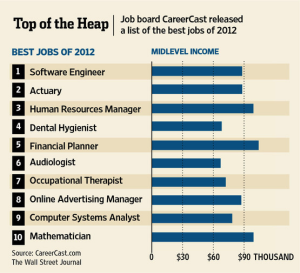Do The Math To Get The Best Jobs
 Studies by the career website CareerCast.com for the past several years have consistently shown that math is often the key to finding the best jobs. WSJ.com recently published an article “Dust Off Your Math Skills: Actuary is Best Job of 2013” reporting the results of the latest study.
Studies by the career website CareerCast.com for the past several years have consistently shown that math is often the key to finding the best jobs. WSJ.com recently published an article “Dust Off Your Math Skills: Actuary is Best Job of 2013” reporting the results of the latest study.
CareerCast ranks 200 jobs from best to worst using the following criteria: physical demands, work environment, income, stress, and hiring outlook. Over the past few years, the top ranked jobs often involve some form of mathematics. Read More »Do The Math To Get The Best Jobs

